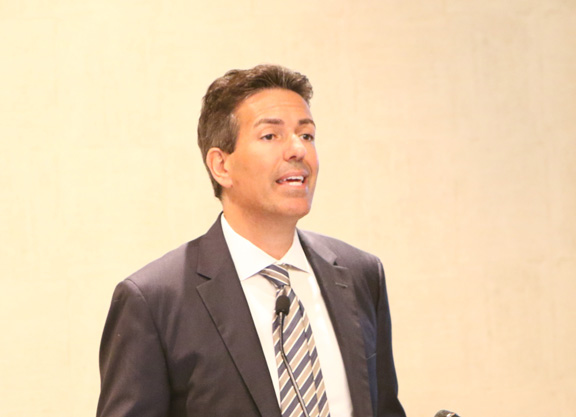By T. D. Thornton
WASHINGTON, DC – Even as United States racing is making diligent strides to integrate aftercare into the sport's business model, the industry needs to get better in tune with the constantly evolving global “humane economy,” lest Thoroughbred racing risk having changes imposed upon it that could threaten the long-term viability of the sport.
That's largely what has happened in the past several decades to other industries where animals are the centerpiece of the economic model, Wayne Pacelle, the president and chief executive officer of the Humane Society of the United States (HSUS), told delegates at Wednesday's International Forum for the Aftercare of Racehorses (IFAR) in Washington, D.C.
Pacelle gave examples of circuses and sea animal shows in the U.S. being forced to cease operations or radically change the way they operate because society now views some of their acts to be inhumane. This progressive animal-first mindset, he said, even extends to food-supply producers who realize customers are increasingly avoiding buying dairy, poultry, meat, and fish products that aren't produced via cage-free or similarly sustainable processes.
“The horse racing community must get in step with these broader trends,” Pacelle said. “There's been too much inattentiveness within the [racing] community to these questions. And it's time to really seize the day, seize these issues, and make them core to the work of the horse racing industry…. When the biggest brands and the multi-million dollar companies are embracing this change, you know something is afoot in this culture.
“Our position is we're not opposed to horse racing as an organization,” Pacelle continued. “If I've said it 10 times, I've said it a thousand times. If these equine athletes are cared for properly, there should not be any compromising of the welfare of the animals. These animals are built to run, in so many ways. But let's make the tracks safe, lets make the conditions safe, let's make the standards strict so that everyone can have confidence about what's going on…. It seems like the most sensible course for the future.”
Pacelle wanted to make two points very clear to IFAR attendees: The HSUS is not so much an “animal rights” organization as people might think, and although it will work in concert with racing's participants to ensure that horses are properly cared for, the HSUS won't lead the battle alone as federal legislation to regulate the sport percolates in Washington.
“We don't really think of ourselves as an 'animal rights' organization,” Pacelle said. “We think more in terms of human responsibility than we do animal rights, because it's really more about [people] and how we handle the immense power that we wield over other creatures.”
Pacelle continued: “The horse racing industry should be at the forefront of this fight. It shouldn't be the Humane Society that's pushing it. It should be people within the industry demanding better standards…. How can horse racing be exempt from these larger cultural and economic trends that we're seeing exhibited in every sector of the economy? I mean, it will be imposed on the industry or the industry will write the rules itself…in an authentic, meaningful way.”
Pacelle said that even with uniform medication standards being adopted by many of the 38 individual states that have pari-mutuel wagering, racing is still “a long way off” from achieving the unity that it will need to thrive (or even survive) in the future.
“The doping of horses, the rates of catastrophic injury, seem to be declining a bit according to The Jockey Club data,” Pacelle said. “But it's still too many. And many of these injuries are preventable, and are derivative of some of the doping activities that have become routine in the industry.
“Our biggest concern is that there is a lack of standards. There's a horse racing statute that allows for federal regulation of gaming, but there's no federal standard for the humane treatment of horses, the animals at the center of the enterprise. They should be at the center of our thinking for the purpose of their welfare and their well-being. So the argument, to us, falls very flat that the federal government shouldn't be involved in [doping regulation] when the federal government is already deeply involved in regulating the gaming side of this.”
With reference to the sport's doping regulation falling under an outside entity like the United States Anti-Doping Agency, Pacelle said, “Why would the horse racing industry be exempt from the larger set of thoughts that exist in our society about cheating in sports? Cheating is going on in the horse racing industry and it's unacceptable. And when you compare the United States to other major racing nations, it looks even worse. So it's time for the community to take responsibility.
“This is the world that we live in now, with [news of horse mistreatments that can spread quickly via] social media and with a customer base that is attuned to the animals,” Pacelle summed. “The creature that has had such a storied role through human history should not be treated like a throwaway commodity.”
Not a subscriber? Click here to sign up for the daily PDF or alerts.






